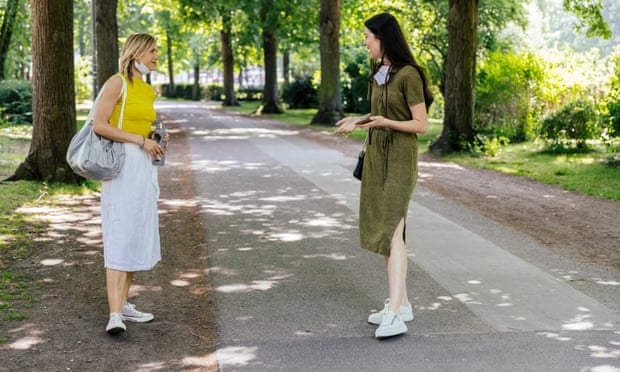The dilemma My former colleague, who became a friend, has always been a little self-centered. Once we stopped working together, I accepted the lopsided nature of our relationship, because I found her fun and we shared the experience of being immigrants navigating British work environments.
We no longer work together but, twice weekly, we share a co-working space that I use to change up my environment and help my mental health. She had a serious mental health setback during lockdown and is, understandably, having a really hard time. She seeks me out to unload on: how unfair she thinks her colleagues are; how they don’t appreciate her; how anxious she is about the pandemic and politics, etc. It’s become less about having conversations and more about listening to an exhausting monologue.
I’ve been very lucky during the pandemic. I have a stable job, home and a partner who supports me. But my own pandemic anxieties mean I don’t have much bandwidth for this kind of one-sided relationship. I want to help her get better, but am feeling drained to the point where I worry that I’ll snap at her.
Mariella replies What a timely missive this is. Truth is, I’ve been noticing an unprecedented escalation of intolerance among my fellow humans: drivers, commuters, people in queues, mask-wearers and non-mask-wearers, supermarket customers, park users. Everywhere I turn I see discord among Britons who are normally renowned for their reserve and good manners.
But, along with changing daily life as we know it, the pandemic is also altering people as we’ve known them. It’s hardly surprising that endless months of ever-changing regulations, an inability to control our destinies, rising levels of worry and fears about work are all playing havoc with our psyches. How we get to grips with this is, perhaps, our greatest challenge.
The other night, I had dinner with a girlfriend who shares my propensity for judgment, forthright opinions and tactlessness, but with whom, aside from one near miss, I have managed to maintain an amiable and highly valued friendship through three decades. We’d both, it turned out, had a bad day, but even that fails to explain the discord that built, kicked off by one small off-note, and escalated into a disagreement on a topic that was entirely underserving of our ire. I could see it happening, I could feel it happening, but I couldn’t seem to stop it.
The rising tension gained a momentum of its own and before we knew it, we were a hair’s breadth from one or other of us storming out. We ended the evening with a hug (I know, I know – the 2m rule was broken), but there was enough of a lingering after-effect to wake me in the middle of the night full of worry about our friendship. The next day, a flurry of texting eventually led to the matter being laid to rest, but left me reeling. I actually think neither of us was guilty of anything more than identifying a suitably resilient target for our deeper distress. We chose well and it’s now relegated to our relationship history – but your letter brought it all back.
It sounds a similar situation with your pal, in that unhealthy levels of pressure are building between you and you haven’t found a way to prise open the lid and let off steam. I’m sure your friend can be self-indulgent and irritating – can’t we all? But, as you point out, you don’t have the bandwidth to cope with her off-loading at the moment. Yet ironically you’re both suffering from the same oppressive Covid-cloud we are all living under. This is a time to be gentle with ourselves and in our handling of each other.
Accepting that, individually, most people are affected in one way or another by this seismic shift in our lives is step one in navigating the minefield of volatile emotions that are building up. Your friend needs support, but you need to protect yourself from becoming her dumping ground. As you rightly observed, boundaries are required, and sharing a workspace a couple of days a week actually offers you the perfect answer. Tell her that similar pressure from forces outside your control are what compelled you to rent the space so you could focus on the job at hand. Impress upon her that you need to concentrate fully on your work for those two days. That means taking all personal interaction outside those hours and away from that venue. Then, perhaps invite her on a hike, or for a coffee or a drink to chat about what’s happening in your lives. That way you can establish some much needed control over your workspace and preserve your relationship.
With more manageable parameters you can show kindness to her without being suffocated by her woes. Increased patience and tolerance for each other and acceptance of everyone’s foibles is an investment for the future that we can all afford to make. It will go a long way toward diminishing the discordant notes sounding out across our land.







